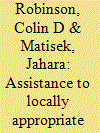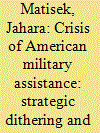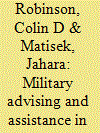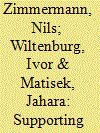|
|
|
Sort Order |
|
|
|
Items / Page
|
|
|
|
|
|
|
| Srl | Item |
| 1 |
ID:
176262


|
|
|
|
|
| Summary/Abstract |
For decades, military assistance in southern Somalia focused on building up a central state army. This reflects standard patterns of Western assistance worldwide. Yet the nature of Somali society and clan, greatly affected by the winnowing process of more than 30 years of conflict, means that most sub-clan groupings are more militarily effective than centralised forces deployed to unfamiliar areas. The centralised Somali National Army remains riven by clan itself, thoroughly politicised, and ineffective (with the exception of the Danab special forces). Based on fieldwork and interviews with military personnel who work in Somalia, Colin D Robinson and Jahara Matisek argue that these locally appropriate forces deserve assistance, albeit with some caveats, in the continuing struggle against Al-Shabaab.
|
|
|
|
|
|
|
|
|
|
|
|
|
|
|
|
| 2 |
ID:
161350


|
|
|
|
|
| Summary/Abstract |
The United States has provided substantial amounts of military assistance and aid since the end of World War Two. During the Cold War, it proved vital in protecting numerous regimes from communist takeovers. Successful outcomes occurred when American leaders made large initial aid commitments, and the states had the capacity and political willpower to use it effectively. However, Vietnam was an example of how U.S. support lagged, as leaders in Saigon preferred political survival instead of creating regime legitimacy. Following 9/11, American security aid focused on making weak countries develop stronger security forces. Unfortunately, this created Fabergé egg militaries: expensive and easily broken by insurgents. This article suggests long-term strategic commitments need to be made alongside more resources for the American State Department and similar organizations to focus on the politics of state-building. Finally, this article suggests strategies, such as “whole-of-government” approaches, to improve long-term security and political institution building.
|
|
|
|
|
|
|
|
|
|
|
|
|
|
|
|
| 3 |
ID:
178639


|
|
|
|
|
| Summary/Abstract |
Southern Somalia has attracted substantial military aid and assistance for decades. As the state disintegrated in the late 1980s, clan dynamics became more critical, warlords emerged, and power bases shifted. Since 2008, the number of foreign military forces and advisors (including private military contractors) has substantially increased, as has the creation of numerous Somali security units. Such actions are symptomatic of broader trends concerning multilateral attempts to rebuild security forces in fractious states, where security assistance activities lack unity or common national interests. This has resulted in various Somali military forces with different loyalties (domestic and international), capabilities, and priorities in each Federal Member State (FMS). Uneven foreign military training programs in the context of survival politics fuels the fragmentation of various security forces. Locally appropriate military forces in each FMS potentially appear to be more effective at resisting Al-Shabaab. However, locally appropriate military forces contribute to further fragmentation, as security donors bypass the Federal Government of Somalia (FGS) to directly assist these localized forces. This accelerates devolution of military forces outside of FGS control. These assessments are based on fieldwork and interviews with security officials in East Africa.
|
|
|
|
|
|
|
|
|
|
|
|
|
|
|
|
| 4 |
ID:
189725


|
|
|
|
|
| Summary/Abstract |
As the West debates defence spending to counter China and Russia, an affordable approach for constructive influence is possible through advising missions that create Sustainable Development Engineering Corps (SDECs) in militaries throughout Africa. Through interviews and surveys of defence officials, Nils Zimmermann, Ivor Wiltenburg and Jahara Matisek find strong support for using European militaries for cost-effective contributions to Western global force posture by creating and deploying advisor units focused on helping African partner militaries establish SDECs.
|
|
|
|
|
|
|
|
|
|
|
|
|
|
|
|
| 5 |
ID:
168004


|
|
|
|
|
| Summary/Abstract |
Security force assistance (SFA) is increasingly emphasised as a way of supporting local partners on the front lines. In this article, Emily Knowles and Jahara Matisek suggest that traditional approaches to SFA are too technical to deal with political problems in fragile states. They suggest a new vision for SFA in fragmented security sectors: a peacebuilding tool for stabilising political settlements that improves relationships across armed groups and between the security sector and civilian population.
|
|
|
|
|
|
|
|
|
|
|
|
|
|
|
|
|
|
|
|
|